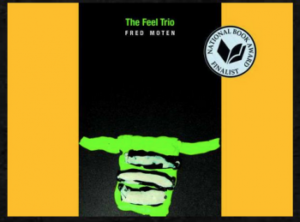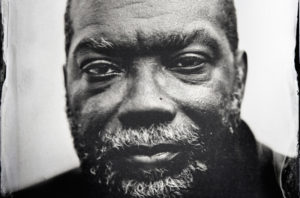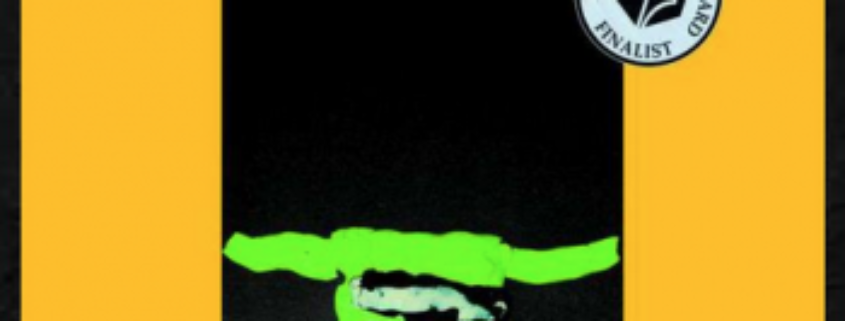Writers Read: The Feel Trio by Fred Moten
 Fred Moten’s writing is being lost. Or found. Or the kind of lost you want—the wind whipping through trees in Alabama or words that come in meaningful bursts, though you are unsure of the meaning or the source of the bursts. You reel in a mad maelstrom of feeling, entirely precognitive but at once familiar, unselfconscious. Fred Moten’s writing seems to settle somewhere in the lizard brain, or perhaps the collective brain, the third eye or whatever you’d like to call community. Black community. The collective black voice. “the violence of the coping strata is specific and seasoned,” he writes; there is a decidedly academic tone here, but one that invites rather than rejects.
Fred Moten’s writing is being lost. Or found. Or the kind of lost you want—the wind whipping through trees in Alabama or words that come in meaningful bursts, though you are unsure of the meaning or the source of the bursts. You reel in a mad maelstrom of feeling, entirely precognitive but at once familiar, unselfconscious. Fred Moten’s writing seems to settle somewhere in the lizard brain, or perhaps the collective brain, the third eye or whatever you’d like to call community. Black community. The collective black voice. “the violence of the coping strata is specific and seasoned,” he writes; there is a decidedly academic tone here, but one that invites rather than rejects.
The Feel Trio is an homage to music, to the musical spaces that gave voice to James Brown and Curtis Mayfield. To the emotional space carved out by the work of James Baldwin.
The Feel Trio is an homage to music, to the musical spaces that gave voice to James Brown and Curtis Mayfield. To the emotional space carved out by the work of James Baldwin. In the last of the three Feel Trios, Fred writes, “I burn communities in shadow, underground, up on the / plateau, then slide with the horny horns. vision’s festival / is folded in overtones and outskirts. j tizol, harry carnival / and feel lined out around an open forte…” There is a definite nod to the genre of jazz here—musicians of color in particular, a reimagining of the life they’ve created with their art and the art that’s created their lives. But it is also music itself, rising and falling and lilting and flowing its own rhythms. In parts, The Feel Trio seems to shed language altogether, settling into sound, echoing perhaps what Lewis Carroll might do with it but in an entirely unique way. An astounding sound coupled with Fred’s voice that appears every once in a while—his colloquial voice, spoken in a noisy café, or his essayistic voice, spoken in a seminar on black radical thought, which are both the same voice but not. His writing is so impenetrable as to be unapologetically black; if you don’t get it then maybe you’re not trying hard enough, not allowing yourself to get it. So dense as to make the brain shudder. So oblique as to only be glimpsed from certain angles, from sufficient distance. In the first of the “feel trios”, entitled block chapel, he writes, “the violence of the coping strata is specific and seasoned.” Fred writes as if he is stating the obvious, but what he writes is power and place, in the same way that jazz states the obvious, fills the sonic space of what hasn’t yet been said. Music and poetry are matters of fact, and matters of love.

photo by Kari Orvik
It’s difficult to be fresh with language. It’s easy, as a writer, to fall into personal patterns or, worse still, clichés or archetypes. And yet Fred achieves this freshness—his work strays so far from archetype as to become wholly unfamiliar, unclassifiable, unexpected, which is to say that I was surprised at almost every line. The rhythms change constantly—undulating between short, terse, verb- and noun-heavy staccato shots and long, meandering lines that approach the structure of an academic paper’s sentences without ever achieving completion. Your mind, as a reader, switches so swiftly between modes of understanding that the recognizable loses its comforting swaddle and you’re left feeling raw and, ultimately, reawakened to the power of language. The way a child feels about language, before the mind settles. Fred’s words scrub the hard exterior of the uncompromising adult, chafe the brain, leave it young and curious once again. This is what the best poetry does, showing us that the ordinary need not be: “Compromised ordinariness,” he writes, “is an ordinary compromise. / as if there’s more danger in the / idea of flight than in staying / home. as if laying back where / you stay precludes flying, as if / the symposium were theirs alone.”
Fred Moten’s The Feel Trio has this something else, this duende, this authenticity of feeling, unweighed by ideation and overt intention, though there is clearly intentionality to the work. It is careful but unrestrained, which is a balance even the best poets struggle to find, but Fred seems to glide into effortlessly.
I sometimes try to explain what poetry is supposed to do to those who do not read it, to those who claim that it’s just not their thing. I want everyone to, because poetry is feeling. But I can’t. Because it’s inexplicable. Or unexplainable. Because, while we might break down the pleasant sonic quality of assonance or the way off rhymes are often more satisfying than straight thymes or the way lines breaks might imbue additional layers of meaning to a poem, all of these are craft, and poetry, good poetry, is meant to have something else. Fred Moten’s The Feel Trio has this something else, this duende, this authenticity of feeling, unweighed by ideation and overt intention, though there is clearly intentionality to the work. It is careful but unrestrained, which is a balance even the best poets struggle to find, but Fred seems to glide into effortlessly.
Fred Moten says astounding things in The Feel Trio, but it is his voice that carries the work. As a reader, I found myself alternating between the discomfort of not knowing what to think (which is an exquisite form of pleasure) and the comfort of familiarity—at times measured and at others bursting with feeling—as if Fred has always been there, coming in from some back room to impart wisdom, advice, or simply conversation. An encouraging word—the oft-repeated refrain, come on get it, which is the name of the second of the feel trios. “but I just want to sit here with you if that’s all right,” writes Fred Moten. Yes. It’s quite all right, Fred. Please do.
References
Moten, Fred. The Feel Trio. Tucson, AZ: Letter Machine Editions, 2014. Print.
 Alex Simand makes his living as an engineer but sometimes muster the courage to call himself a writer. Alex holds an MFA in Creative Writing from Antioch University Los Angeles. He lives in San Francisco, hails from Toronto, and probably talks about poutine too much. Alex worked on Lunch Ticket for the past two issues in various roles, including copyeditor, CNF editor, and, most recently, blog editor. His work has appeared in Angel City Review, Ash & Bones, Ultraviolet Tribe, Drunk Monkeys, Mudseason Review, and Red Fez, among others. He has been nominated for several Pushcart Prizes and a Best of the Net Award. Alex writes good essays, bad poems, and vice-versa.
Alex Simand makes his living as an engineer but sometimes muster the courage to call himself a writer. Alex holds an MFA in Creative Writing from Antioch University Los Angeles. He lives in San Francisco, hails from Toronto, and probably talks about poutine too much. Alex worked on Lunch Ticket for the past two issues in various roles, including copyeditor, CNF editor, and, most recently, blog editor. His work has appeared in Angel City Review, Ash & Bones, Ultraviolet Tribe, Drunk Monkeys, Mudseason Review, and Red Fez, among others. He has been nominated for several Pushcart Prizes and a Best of the Net Award. Alex writes good essays, bad poems, and vice-versa.





